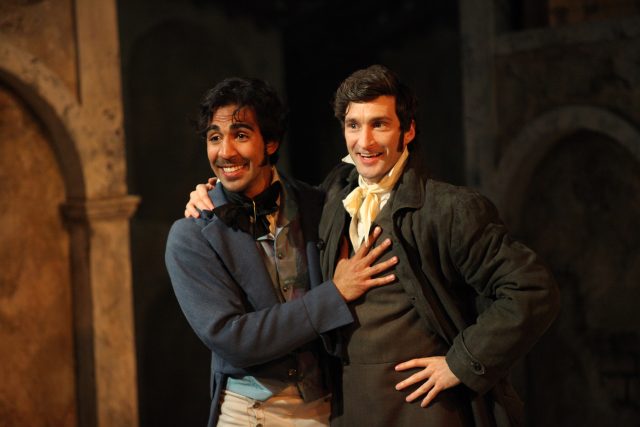
Credit: David Blue
At Bard on the Beach. Held over until September 20, 2017
Tickets from $21 at bardonthebeach.org
Posted July 24, 2017
Finally someone has the wit and the nerve to do something about the unsatisfying conclusion of The Two Gentlemen of Verona, making it palatable for a contemporary audience. That someone is director Scott Bellis. Not only does he bring the curtain down on a thrillingly provocative note but he cast the most solemn yet adorable Basset hound (Gertie) as Crab. On the night I attended, Gertie had the audience in gales of laughter with her sad eyes and, at one point, the unabashed licking of her nether parts.
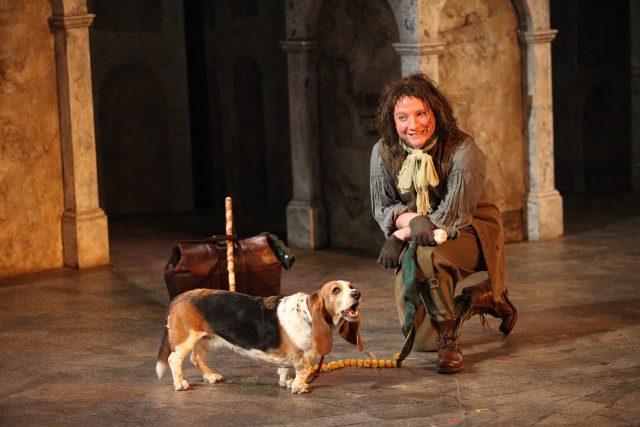
Credit: David Blue
As in many of Shakespeare’s plays in which the so-called happy ending doesn’t sit well, especially with women, Two Gentlemen presents the same problem: we spend the early part of the play watching Proteus (Charlie Gallant) sighing for love of Julia (Kate Besworth) then suddenly falling for Silvia (Adele Noronha), the betrothed of his best friend Valentine (Nadeem Phillip). That gets sorted out but just as Portia deserves better than Bassanio in The Merchant of Venice, so Julia deserves better than Proteus. And arguably, Silvia deserves better than Valentine. Valentine’s boys-will-be-boys forgiveness of Proteus, who has actually attempted to rape Silvia, might be seen as Christian charity but for most of us Proteus is just a jerk and undeserving of forgiveness. His immaturity and joie de vivre is no excuse for betrayal after betrayal.
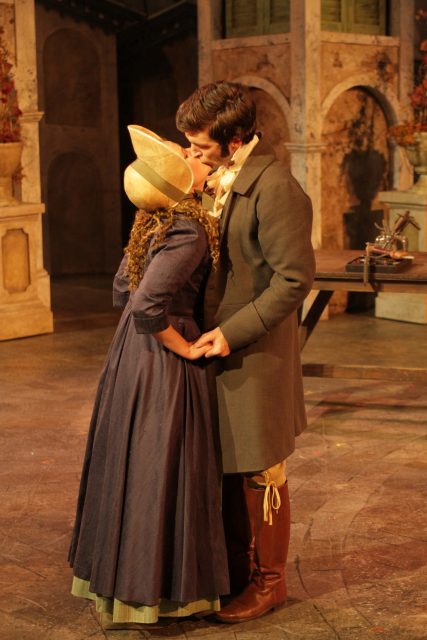
Credit: David Blue
Written in Shakespeare’s twenties, Two Gentlemen is an early comedy with ideas that he used and re-used for years to come: sudden romantic turnabouts (think of Romeo pining for Rosaline until he lays eyes on Juliet); a lover wooing on behalf of another (Viola/Cesario in Twelfth Night) and young women cross-dressed as young men (too numerous to count).
With sumptuous gowns on the gentlewomen, a wonderfully layered raggedy costume on the Hostess (Olivia Hutt) and very ‘Three Musketeer-ish’ getups with broad, plumed hats on the outlaws, costume designer Mara Gottler makes the actors look fabulous. The set, designed by scenic designer Marshall McMahen for both Two Gentlemen as well as The Merchant of Venice, works equally well for both; in Two Gentlemen, the windows in the stone towers are green-shuttered in rustic Verona but open up to reveal sparkling crystal chandeliers when the action moves to cosmopolitan Milan. Sound design by Julie Casselman is lush but unobtrusive and perfect for the various dance scenes.
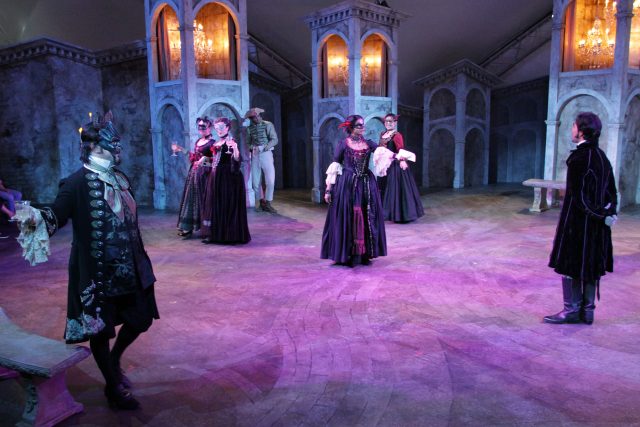
And, oh, the dances! Choreographed by Tara Cheyenne Friedenberg, the first is all puppy love between Julia and Proteus; the second, featuring Valentine and Silvia is elegant, erotic and super-romantic; the third is a boisterous, heyday dance with the Hostess and Launce (Andrew Cownden). Absolutely stunning is the masked dance with slow, courtly choreography and dazzling costumes. And there’s some pretty sharp swordplay choreographed by Josh Reynolds, too.
Phillip and Noronha are well cast as lovers; he, initially boyish, matures as his character Valentine comes to some self-awareness over the course of the play. Noronha brings dark-eyed beauty and gravitas to Silvia. Launce (Andrew Cownden) and Speed (Chirag Naik), servants to Proteus and Valentine respectively, are the source of most of the considerable humour. Naik is wired and sprightly while Cownden, Gertie in tow, is a bit of a sly country bumpkin and very, very funny. Director Bellis gives Cownden some good extra lines including one that Launce admits was not written by Shakespeare. If you want a play about “Jews and Christians”, says Launce, you should see The Merchant of Venice.
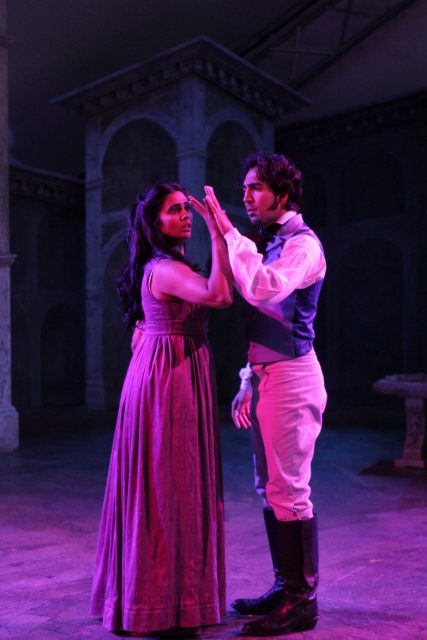
Credit: David Blue
You should see The Two Gentlemen of Verona; it’s brilliantly conceived and brilliantly executed. Some performances are already sold out so if you plan to see it, get your tickets soon. Rain or shine, it’s always comfortable under the tents both large and small.
The pick of the Bard 2017 litter, Two Gentlemen is creative, provocative and entertaining. I was buzzing with excitement as the curtain fell and I’m still thrilled.
Hats off to director Scott Bellis for his intelligent and witty re-interpretation of a difficult play. It wouldn’t be surprising if his take on the play were to be picked up by other theatre companies and The Two Gentlemen of Verona, seldom mounted in the past, becomes popular.

